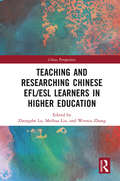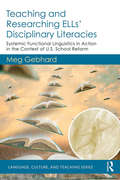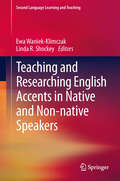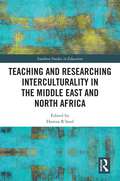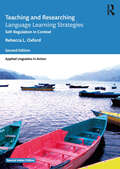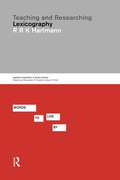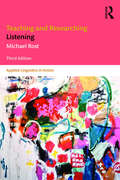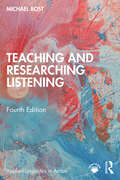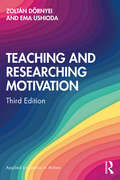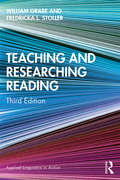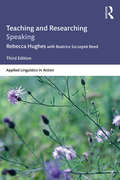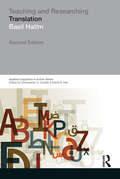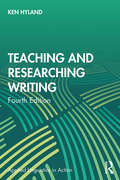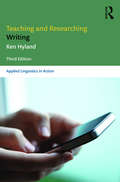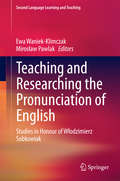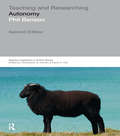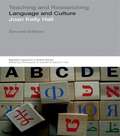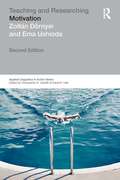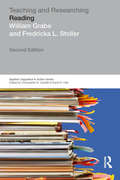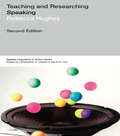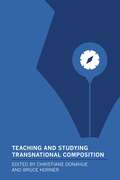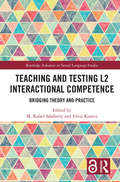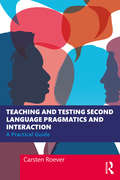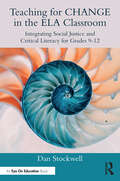- Table View
- List View
Teaching and Researching Chinese EFL/ESL Learners in Higher Education (China Perspectives)
by Zhongshe LuChina has attached great importance to teaching students to become proficient users of English. Yet, despite a plethora of studies and practice on Chinese ESL/EFL (English as a second/foreign language) learners, the large student population, its complicated composition and the complex nature of second and foreign language learning have rendered it difficult to offer a panoramic view on ESL/EFL teaching and learning of Chinese learners. This book provides a new and up-to-date perspective on the teaching and learning of Chinese ESL/EFL learners. The book collects 15 case studies, falling into two parts—Curriculum Development and Teaching Practice and Skills-Based Research. The collected studies deploy qualitative, quantitative or mixed methods to explore patterns, features, developments and causes and effects of a variety of issues in the sphere of ESL/EFL teaching and learning. Moreover, the cases offer insights that are relevant beyond the mainland Chinese context such as Hong Kong, Macau, Britain and Australia. Students and scholars of TESOL and applied linguistics will be interested in this title.
Teaching and Researching ELLs’ Disciplinary Literacies: Systemic Functional Linguistics in Action in the Context of U.S. School Reform (Language, Culture, and Teaching Series)
by Meg GebhardWritten from a critical perspective, this volume provides teachers, teacher educators, and classroom researchers with a conceptual framework and practical methods for teaching and researching the disciplinary literacy development of English language learners (ELLs). Grounded in a nuanced critique of current social, economic, and political changes shaping public education, Gebhard offers a comprehensive framework for designing curriculum, instruction, and assessments that build on students’ linguistic and cultural resources and that are aligned with high-stakes state and national standards using the tools of systemic functional linguistics (SFL). By providing concrete examples of how teachers have used SFL in their work with students in urban schools, this book provides pre-service and in-service teachers, as well as literacy researchers and policy makers, with new insights into how they can support the disciplinary literacy development of ELLs and the professional practices of their teachers in the context of current school reforms. Key features of this book include the voices of teachers, examples of curriculum, sample analyses of student writing, and guiding questions to support readers in conducting action-oriented research in the schools where they work.
Teaching and Researching English Accents in Native and Non-native Speakers
by Ewa Waniek-Klimczak Linda R. ShockeySecond language phonology is approached in this book from the perspective of data-based studies into the English sound system as used by native and non-native speakers of the language. The book offers a unique combination of psycholinguistic, sociolinguistic and pedagogical approaches, with individual contributions investigating the effect of selected conditioning factors on the pronunciation of English. With all the richness of approaches, it is a strong phonetic background that unifies individual contributions to the volume. Thus, the book contains a large body of original, primary research which will be of interest to experienced scientist, practitioners and lecturers as well as graduate students planning to embark on empirical methods of investigating the nature of the sound system
Teaching and Researching Interculturality in the Middle East and North Africa (Southern Studies in Education)
by R’boul HamzaFocusing on the emerging intercultural encounters in the Middle East and North Africa (MENA), this book brings together diverse perspectives from the region to explore understandings and practices of interculturality in different educational environments.Teaching and researching interculturality has received increasing attention from scholars and educators alike in the Middle East and North Africa (MENA) region due to intensified cross-cultural interactions resulting from recent economic and political changes. In the face of these challenges and complexities, this edited volume aims to (a) develop an in-depth understanding of how interculturality is processed and taught in different educational settings (middle school, high school, and university) by different actors (students, teachers and curriculum designers, policy makers, etc.) and (b) construct context-sensitive, critical, and nuanced perspectives, theories, and practices for teaching and researching interculturality. While 'interculturality' is an overarching notion in this book, the chapters use different 'labels' to refer to interculturality in education, communication, and research, with a particular focus on sociologies of knowledge in seven countries.This title is essential read for educators, researchers, and policy makers interested in the intersection of language and sociology, as well as intercultural education and communication in the region.
Teaching and Researching Language Learning Strategies: Self-Regulation in Context, Second Edition (Applied Linguistics in Action)
by Rebecca L. OxfordNow in its second edition, Teaching and Researching Language Learning Strategies: Self-Regulation in Context charts the field systematically and coherently for the benefit of language learning practitioners, students, and researchers. This volume carries on the author's tradition of linking theoretical insights with readability and practical utility and offers an enhanced Strategic Self-Regulation Model. It is enriched by many new features, such as the first-ever major content analysis of published learning strategy definitions, leading to a long-awaited, encompassing strategy definition that, to a significant degree, brings order out of chaos in the strategy field. Rebecca L. Oxford provides an intensive discussion of self-regulation, agency, and related factors as the "soul of learning strategies." She ushers the strategy field into the twenty-first century with the first in-depth treatment of strategies and complexity theory. A major section is devoted to applications of learning strategies in all language skill areas and in grammar and vocabulary. The last chapter presents innovations for strategy instruction, such as ways to deepen and differentiate strategy instruction to meet individual needs; a useful, scenario-based emotion regulation questionnaire; insights on new research methods; and results of two strategy instruction meta-analyses. This revised edition includes in-depth questions, tasks, and projects for readers in every chapter. This is the ideal textbook for upper-level undergraduate and graduate courses in TESOL, ELT, education, linguistics, and psychology.
Teaching and Researching Lexicography (Applied Linguistics in Action)
by R. R. HartmannWho compiles dictionaries and other reference works? Which are used by whom? How do they achieve their purpose?Lexicography is a very important subject and the product of lexicography, the Dictionary, is a valuable resource in language learning.Teaching and Researching Lexicography explains the relations between lexicographic practice (dictionary-making) and theory (dictionary research), with special reference to the perspectives of:* dictionary history * dictionary criticism * dictionary typology* dictionary structure* dictionary useThe final section of the book contains a variety of useful resources, including relevant related websites, a glossary of terms and a bibliography of cited dictionaries. This section can also be found on the Teaching and Researching Lexicography companion web-site.Written in a highly accessible style, Teaching and Researching Lexicography provides the most comprehensive, up-to-date and international coverage of this field in English, and will be of great interest to lexicographers, language teachers and applied linguists.
Teaching and Researching Listening: Third Edition (Applied Linguistics in Action)
by Michael RostNow in its third edition, Teaching and Researching Listening renews its commitment to provide language educators, practitioners, and researchers in the fields of ESL, TESOL, and Applied Linguistics with a state-of-the-art treatment of the linguistic, psycholinguistic and pragmatic processes underpinning oral language use, and demonstrates how they influence listening in a variety of practical contexts. This revised edition incorporates significantly updated sections on neurological processing, pragmatic processing, automated processing, and pragmatic assessment, as well as coverage of emerging areas of interest in L1 and L2 instruction and research. Boxes throughout, including "Concepts" and "Ideas From Practitioners", help to both reinforce readers’ understanding of the topics covered and ground them in a practical context, while the updated chapter, "Exploring listening", contains an overhauled section on listening technologies that provide readers with a range of tools to explore other perspectives on listening. Combining detailed overviews of the underlying processes of listening with an exhaustive set of practical resources, this third edition of Teaching and Researching Listening serves as an authoritative comprehensive survey of issues related to teaching and researching oral communication for language teachers, practitioners, and researchers.
Teaching and Researching Listening: Third Edition (Applied Linguistics in Action)
by Michael RostWidely considered to be a foundational work in the field of listening, Teaching and Researching Listening is among the most recommended textbooks in applied linguistics oral communication courses, and the most cited reference in current research on second language listening development. Known for its comprehensiveness, clarity, insight, and practical applications, this fourth edition has been substantially revised to reflect the latest research in the areas of linguistics, neuroscience, applied technologies, and teaching methodology, with expanded sections on teaching applications and explorations in social research related to listening.This completely revised edition includes:• Detailed overviews of the underlying processes of listening, with additional coverage of decoding processes• Expansion of sections dealing with artificial intelligence (AI), speech recognition, and input enhancement software• Emphasis on research of listening in spoken interaction and cross-cultural communication • Clear templates for instructors and curriculum designers, with an expansive set of practical resources• Guidance in using observational methods for exploring listening in a range of educational and professional contexts• Website support, with presentation slides, infographics, and question banks for each chapterThis fourth edition of Teaching and Researching Listening serves as an authoritative and comprehensive survey of issues related to teaching and researching oral communication, providing value for language teachers, educational researchers, instructional designers, interpreters, and other language practitioners.
Teaching and Researching Motivation (Applied Linguistics in Action)
by Zoltán Dörnyei Ema UshiodaCultivating motivation is crucial to a language learner's success – and therefore crucial for the language teacher and researcher to understand. The third edition of Teaching and Researching Motivation reflects the dramatic changes in the field of motivation research. With an increased emphasis on dynamic perspectives on motivation and its relations with other individual, social and contextual factors, this book offers ways in which advances in the field can be put to practical use in the classroom and in research. Key new features and material: exploration of the motivation to learn languages other than English (LOTEs); principles for designing L2 motivational studies; discussion of emerging areas of research, including unconscious motivation and language learning mindsets. Providing a clear and comprehensive theory-driven account of motivation, Teaching and Researching Motivation examines how theoretical insights can be used in everyday teaching practice. The final section provides a range of useful resources, including relevant websites, key reference works and an online repository of tools and instruments for researching language learning motivation. Fully revised by pre-eminent researchers in this field, Zoltán Dörnyei and Ema Ushioda, this is an invaluable resource for teachers and researchers alike.
Teaching and Researching Reading: Third Edition (Applied Linguistics in Action)
by William Grabe Fredricka L. StollerNow in its third edition, Teaching and Researching Reading charts the field of reading (first and second language) systematically and coherently for the benefit of language teaching practitioners, students, and researchers. This volume provides background on how reading works and how reading differs for second language learners. The volume includes reading-curriculum principles, evidence-based teaching ideas, and a multi-step iterative process for conducting meaningful action research on reading-related topics. The volume outlines 14 projects for teacher adaptation and use, as well as numerous new and substantially expanded resource materials that can be used for both action research and classroom instruction.
Teaching and Researching Speaking: Third Edition (Applied Linguistics in Action)
by Beatrice Szczepek Reed Rebecca HughesTeaching and Researching Speaking provides an overview of the main approaches to researching spoken language and their practical application to teaching, classroom materials, and assessment. The history and current practices of teaching and researching speaking are presented through the lens of bigger theoretical issues about the object of study in linguistics, social attitudes to the spoken form, and the relationships between spoken and written language. A unique feature of the book is the way it clearly explains the nature of speaking and how it is researched and puts it into the context of a readable and holistic overview of language theory. This new edition is fully updated and revised to reflect the latest developments on classroom materials and oral assessment, as well as innovations in conversation analysis. The resources section is brought up-to-date with new media and currently available networks, online corpora, and mobile applications. This is a key resource for applied linguistics students, English language teachers, teacher trainers, and novice researchers.
Teaching and Researching Translation (Applied Linguistics in Action)
by Basil A. HatimTeaching & Researching Translation provides an authoritative and critical account of the main ideas and concepts, competing issues, and solved and unsolved questions involved in Translation Studies. This book provides an up-to-date, accessible account of the field, focusing on the main challenges encountered by translation practitioners and researchers. Basil Hatim also provides readers and users with the tools they need to carry out their own practice-related research in this burgeoning new field. This second edition has been fully revised and updated through-out to include: The most up-to-date research in a number of key areas A new introduction, as well as a new chapter on the translation of style which sets out a new agenda for research in this field Updated examples and new concepts Expanded references, bibliography and further reading sections, as well as new links and resources Armed with this expert guidance, students of translation, researchers and practitioners, or anyone with a general interest in this fast-developing field can explore for themselves a range of exemplary practical applications of research into key issues and questions. Basil Hatim is Professor of Translation & Linguistics at the American University of Sharjah, UAE and theorist and practitioner in English/Arabic translation. He has worked and lectured widely at universities throughout the world, and has published extensively on Applied Linguistics, Text Linguistics, Translation/Interpreting and TESOL.
Teaching and Researching Writing (Applied Linguistics in Action)
by Ken HylandThe new edition of Ken Hyland’s text provides an authoritative guide to writing theory, research, and teaching. Emphasising the dynamic relationship between scholarship and pedagogy, it shows how research feeds into teaching practice. Teaching and Researching Writing introduces readers to key conceptual issues in the field today and reinforces their understanding with detailed cases, then offers tools for further investigating areas of interest. This is the essential resource for students of applied linguistics and language education to acquire and operationalise writing research theories, methods, findings, and practices––as well as for scholars and practitioners looking to learn more about writing and literacy. New to the fourth edition: Added or expanded coverage of important topics such as translingualism, digital literacies and technologies, multimodal and social media writing, action research, teacher reflection, curriculum design, teaching young learners, and discipline-specific and profession-specific writing. Updated throughout––including revision to case studies and classroom practices––and discussion of Rhetorical Genre Studies, intercultural rhetoric, and expertise. Reorganised References and Resources section for ease of use for students, researchers, and teachers.
Teaching and Researching Writing: Third Edition (Applied Linguistics in Action)
by Ken HylandThis third edition of Teaching and Researching Writing continues to build upon the previous editions' work of providing educators and practitioners in applied linguistics with a clearly written and complete guide to writing research and teaching. The text explores both theoretical and conceptual questions, grapples with key issues in the field today, and demonstrates the dynamic relationship between research and teaching methods and practice. This revised third edition has been reorganized to incorporate new topics, including discussions of technology, identity, and error correction, as well as new chapters to address the innovative directions the field has taken since the previous edition's publication. Boxes throughout, including "Concepts" and "Quotes", help to both reinforce readers' understanding of the topics covered by highlighting key ideas and figures in the field, while the updated glossary and resource sections allow readers to further investigate areas of interest. This updated edition of Teaching and Researching Writing is the ideal resource for language teachers, practitioners, and researchers to better understand and apply writing research theories, methods, and practices.
Teaching and Researching the Pronunciation of English
by Mirosław Pawlak Ewa Waniek-KlimczakThe book contains contributions from practitioners and theoreticians who explore the pronunciation of English from various perspectives: phonetic, phonological, psycholinguistic and sociolinguistic. In accordance with the unifying theme of the volume, individual contributions investigate the characteristics of a foreign accent, its production and perception, study the development of methods and techniques in pronunciation teaching, evaluate their use in classroom materials and in the classroom itself, and investigate the conditions for second language learning and teaching from the perspective of learners and teachers. The book offers a unique combination of a scholarly research with practical applications, inspired over the years by the work of Professor Włodzimierz Sobkowiak, who has researched pronunciation teaching and pioneered technology-oriented, corpus-based approaches to the study of English pronunciation in Poland.
Teaching and Researching: Autonomy in Language Learning (Applied Linguistics in Action)
by Phil BensonAutonomy has become a keyword of language policy in education systems around the world, as the importance of independent learning and new technologies has grown. Now in a fully revised and updated second edition, Teaching and Researching Autonomy provides an accessible and comprehensive critical account of the theory and practice of autonomy. Examining the history of the concept, it addresses important questions of how we can identify autonomy in language learning behaviours and how we can evaluate the wide variety of educational practices that have been designed to foster autonomy in learning. Topics new to this edition include: - Autonomy and new technologies - Teacher autonomy - The sociocultural implications of autonomy With over three hundred new references and five new case studies of research on autonomy providing practical advice on research methods and topics in the field, Teaching and Researching Autonomy will be an essential introduction for teachers and students to a subject at the cutting edge of language teaching and research.
Teaching and Researching: Language and Culture (Applied Linguistics in Action)
by Joan Kelly HallLanguage and culture are concepts increasingly found at the heart of developments in applied linguistics and related fields. Taken together, they can provide interesting and useful insights into the nature of language acquisition and expression. In this volume, Joan Kelly Hall gives a perspective on the nature of language and culture looking at how the use of language in real-world situations helps us understand how language is used to construct our social and cultural worlds.The conceptual maps on the nature of language, culture and learning provided in this text help orient readers to some current theoretical and practical activities taking place in applied linguistics. They also help them begin to chart their own explorations in the teaching and researching of language and culture.
Teaching and Researching: Motivation (Applied Linguistics in Action)
by Zoltán Dörnyei Ema UshiodaCultivating motivation is crucial to a language learner's success - and therefore crucial for the language teacher and researcher to understand. This fully revised edition of a groundbreaking work reflects the dramatic changes the field of motivation research has undergone in recent years, including the impact of language globalisation and various dynamic and relational research methodologies, and offers ways in which this research can be put to practical use in the classroom and in research. Key new features and material:· A brand new chapter on current socio-dynamic and complex systems perspectives · New approaches to motivating students based on the L2 Motivational Self System· Illustrative summaries of qualitative and mixed methods studies· Samples of new self-related motivation measures Providing a clear and comprehensive theory-driven account of motivation, Teaching and Researching Motivation examines how theoretical insights can be used in everyday teaching practice, and offers practical tips. The final section provides a range of useful resources, including relevant websites, key reference works and tried and tested example questionnaires. Written in an accessible style and illustrated with concrete examples, it is an invaluable resource for teachers and researchers alike.
Teaching and Researching: Reading
by William Peter Grabe Fredricka L. StollerTeaching and Researching Reading was first written to help language professionals understand the complex nature of reading. Now in a thoroughly updated and improved second edition, the book expands connections from research on reading to instructional practices and teacher-initiated action research. Offering an updated overview of reading theory, it summarises key ideas and issues in first and second language contexts. In addition to providing insightful research analyses, Grabe and Stoller offer practical advice for practitioners and researchers, including evidence-based teaching ideas and a multi-step iterative process for conducting meaningful action research on reading-related topics. The volume outlines 29 projects for teacher adaptation and use, as well as numerous new or substantially expanded resource materials that can be used for both action research and classroom instruction. Learning aids featured throughout the volume include · key concept boxes and a glossary of key terms · quote boxes highlighting critical issues in the field · resource lists of relevant journals, books and websites Fully revised throughout, with a range of new exemplary L1 and L2 research studies and an entirely new chapter on the move from research implications to instructional applications, this second edition of Teaching and Researching Listening is an invaluable resource for teacher trainers, practicing teachers, materials writers and researchers alike.
Teaching and Researching: Speaking
by Rebecca HughesSpeaking is a dynamic, interpersonal process and one that strongly influences how we are perceived by others in a range of formal and everyday contexts. Despite this, speaking is often researched and taught as if it is simply writing delivered in a different mode. In Teaching and Researching Speaking, Rebecca Hughes suggests that we have less understanding than we might of important meaning-making aspects of speech such as prosody, gaze, affect, and the ways speakers collaborate and negotiate with one another in interaction. This thoroughly revised and updated second edition looks to the future of the field, offering: A new chapter on assessment, discussing 'high stakes' oral language testing contexts such as immigration New material considering access to spoken data via the worldwide web and new technologies that allow neurolinguistic insights formerly hidden from view Summaries and case studies to help the reader understand how to approach researching speaking and encourages practitioners to question the models of speaking that they are using in their classrooms. Reviewing materials and assessment practices in the light of current knowledge about spoken language, and highlighting areas for new work and collaboration between researchers and practitioners, this book will be a valuable resource for anyone involved in language teaching.
Teaching and Studying Transnational Composition
by Christiane Donahue and Bruce HornerTransnational composition is a site for engaging with difference across populations, economies, languages, and borders and for asking how cultures, languages, and national imaginaries interanimate one another.Organized in three parts, the book addresses the transnational in composition in scholarship, teaching, and administration. It brings together contributions from institutional, geopolitical, and cultural contexts ranging across North America, Europe, Latin America, Africa, the Middle East, Asia, and the Caribbean and covers writing in English, Chinese, multiple European languages, Latin American Spanish, African and West Indian Creoles, and Guianan French. Exploring the relationship among transnational, international, global, and translingual approaches to composition--while complicating the term composition itself--essays draw on theories of border work, mobility, liminality, cross-border interaction, center-periphery contours, superdiversity, and transnational rhetoric and address, among other topics, models of cognitive processing, principles of universal design, and frames of critical literacy awareness.
Teaching and Testing L2 Interactional Competence: Bridging Theory and Practice (Routledge Advances in Second Language Studies)
by M. Rafael Salaberry Silvia KunitzThis volume features the latest research findings on L2 interactional competence to demonstrate the potential for developing and implementing research-based pedagogy that targets interactional competence (IC) in early instruction in a variety of L2 learning and teaching contexts. Incorporating contributions from both leading and emerging researchers in the area, the book is organized into four sections to provide a systematic account of interactional competence, defined as a set of skills required to co-construct an effective interaction with a variety of interlocutors in a variety of settings, and advocates for IC to be part of a well-rounded curriculum of L2 instruction. The volume provides a comprehensive overview of the different theoretical perspectives on IC within Conversation Analysis, and moves into a discussion of conversation-analytic research findings from a variety of contexts and of their pedagogical implications.The book then presents examples of pedagogy in practice and also illustrates the potential for implementing IC in testing settings. This volume makes a valuable contribution to the growing literature on interactional competence and will be of particular interest to graduate students and researchers in applied linguistics, SLA, language education, curriculum and instruction studies, and educational linguistics.
Teaching and Testing Second Language Pragmatics and Interaction: A Practical Guide
by Carsten RoeverPragmatic ability is crucial for second language learners to communicate appropriately and effectively; however, pragmatics is underemphasized in language teaching and testing. This book remedies that situation by connecting theory, empirical research, and practical curricular suggestions on pragmatics for learners of different proficiency levels: It surveys the field comprehensively and, with useful tasks and activities, offers rich guidance for teaching and testing L2 pragmatics. Mainly referring to pragmatics of English and with relevant examples from multiple languages, it is an invaluable resource for practicing teachers, graduate students, and researchers in language pedagogy and assessment.
Teaching and Training for Global Engineering: Perspectives on Culture and Professional Communication Practices
by Madelyn Flammia Kirk St. AmantProvides a foundation for understanding a range of linguistic, cultural, and technological factors to effectively practice international communication in a variety of professional communication arenas An in-depth analysis of how cultural factors influence translation, document design, and visual communication A review of approaches for addressing the issue of international communication in a range of classes and training sessions A summary of strategies for engaging in effective e-learning in international contexts A synopsis of how to incorporate emerging media into international teaching and training practices
Teaching for CHANGE in the ELA Classroom: Integrating Social Justice and Critical Literacy for Grades 9-12
by Dan StockwellThis book can help you incorporate critical literacy pedagogy into your high school English Language Arts (ELA) classroom, so that your students can use what they study in class to work toward making a more just and equitable world.Through the acronym CHANGE, the book explores how critical literacy pedagogy can support students as they Challenge injustice to Help make a difference in the world by Asking and answering tough questions and Noticing ways to Get involved and Engaged in making the world a better place. It first centers on the theory behind critical literacy pedagogy with Bob Fecho’s concept of wobble, the tensions teachers experience when different points of view collide in the classroom, and why being mindful of and responding to moments of wobble can help educators grow in their teaching practice. The book then provides practical, specific suggestions by grade level for high school ELA teachers to implement critical literacy pedagogy in their classrooms, and address the tensions and moments of discomfort and uncertainty they might experience while providing critical literacy pedagogy.With detailed lesson plans and case study examples from in-service ELA teachers, this book is an incredible resource for high school language arts teachers who are interested in teaching for social justice and integrating critical literacy pedagogy into their classrooms.
